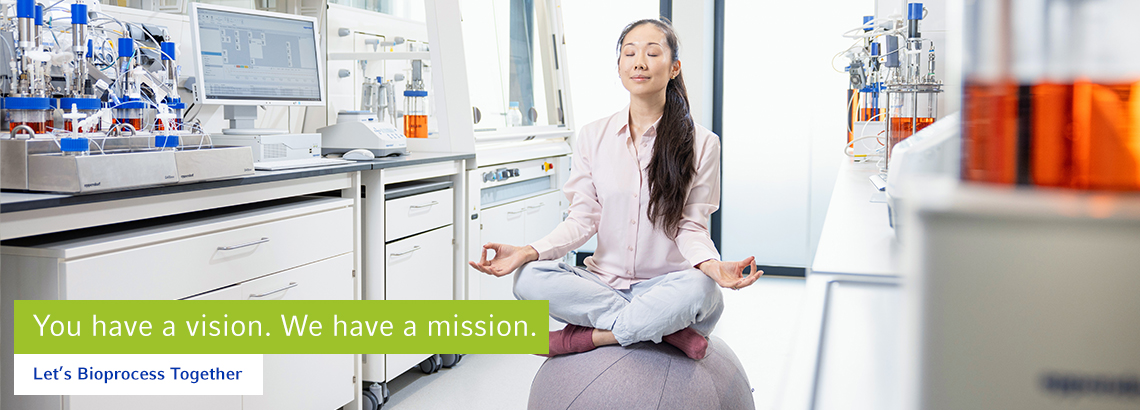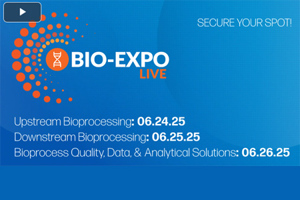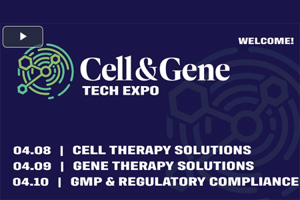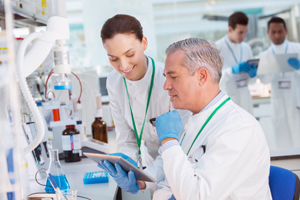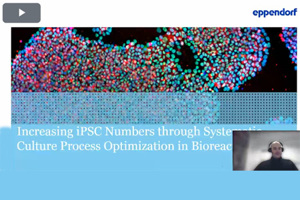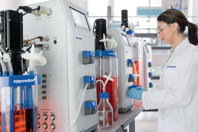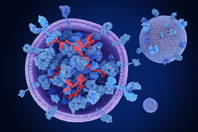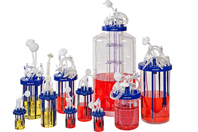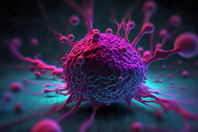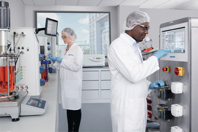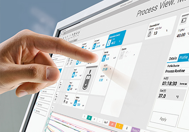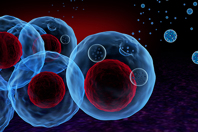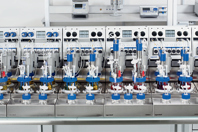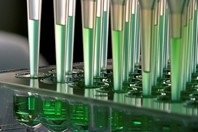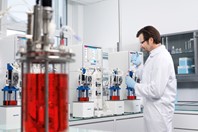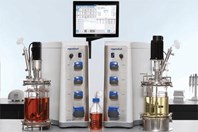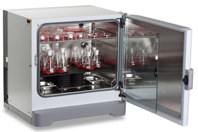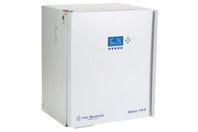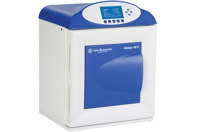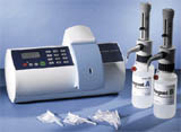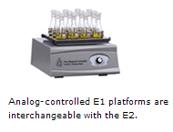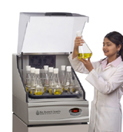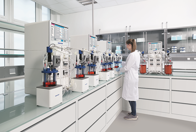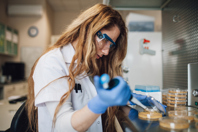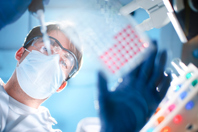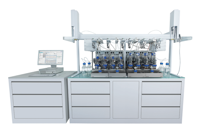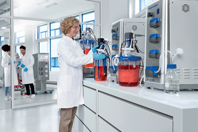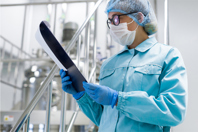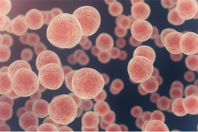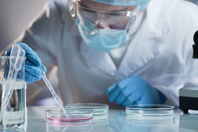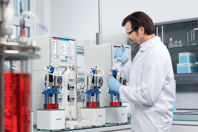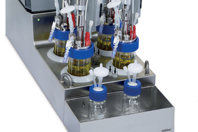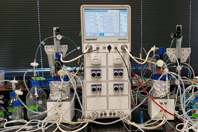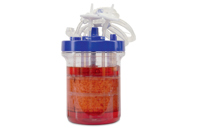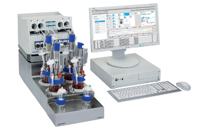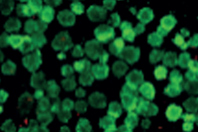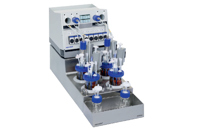
ABOUT EPPENDORF
Let’s Bioprocess Together
At Eppendorf, our aim is to empower you on your upstream bioprocess journey. We provide trusted and innovative bioprocess solutions to develop cell culture and fermentation bioprocesses and move them from R&D to production. We have orchestrated our scalable bioprocess systems, single-use bioreactors, software solutions, and services to optimize process control, automate routine tasks, and harness the power of data. We listen to your specific challenges and work together with you to solve them. The bottom line is more speed, less risk, and more success in your business.
Our purpose is to help bring life-saving treatments to the world. With our bioprocess solutions and in line with our corporate mission, we contribute to the efforts of Eppendorf customers worldwide to improve human living conditions.
Since 1945, the Eppendorf brand has been synonymous with customer-oriented processes and innovative products, such as laboratory devices and consumables for liquid handling, cell handling and sample handling. Today, Eppendorf and its more than 5000 employees serve as experts and advisors, using their unique knowledge and experience to support laboratories and research institutions around the world.
FEATURED CONTENT
-
Discover how engineered exosomes, displaying tumor-homing peptides, offer a promising tool for targeted cytotoxic drug delivery, produced efficiently with a bioreactor for critical research.
-
Learn how stirred-tank bioreactors overcome the scalability limitations of static culture for MSC-EV production, while Raman spectroscopy provides unprecedented real-time quality monitoring during production.
-
Reduce the time and risks involved in maintaining a traditional bioreactor with this single-use solution for biopharmaceutical manufacturers.
-
Explore the growing field of cell and gene therapies along with a bioreactor system that is enabling researchers to expedite cell culture development and optimize their research time.
-
Take a deeper look into innovative solutions for researchers facing challenges throughout the development of novel cell and gene therapeutics.
-
By exploring innovative approaches to scaling up animal cell growth in cutting-edge bioreactor systems, foodtech companies are poised to offer healthier, safer, more sustainable fish for consumers.
-
Review the distinct steps in the plasmid production workflow, along with tips for optimization from vector and strain selection to cultivation and beyond.
-
Explore a study demonstrating the use of dielectric spectroscopy tools for monitoring expansion and differentiation of hiPSC aggregates in stirred-tank bioreactors.
-
Explore the question of how to keep bioprocess conditions consistent between different runs and receive expert tips on maintaining complex culturing conditions and parameters.
-
Application scientist, Dr. Jorge Escobar Ivirico, explains and underscores the key differences with the production of exosomes from other cellular therapies.
-
Selecting the bioreactor that is best for your process and the dedicated space you have available requires consideration of many important factors.
-
In this white paper we explain the key characteristics of stirred-tank bioreactors and which organisms are typically grown in them.
-
This article examines some of the currently available schemes used in generating rAAV from suspension cultures, and describes what it takes to achieve scalable rAAV production.
-
This article collection highlights the importance of continued research and development in the field of bioprocessing to revolutionize the next generation of therapies and personalized medicine.
CONTACT INFORMATION
Eppendorf SE
Bioprocess Center, Rudolf-Schulten-Straße 5
Jülich, 52428
GERMANY
NEWS
PRODUCTS
-
The SciVario twin is a future proof bioprocess controller, developed by Eppendorf, with the intuitive software, bringing the digital age to the laboratory.
-
Whether your process includes cell culture or fermentation, autoclavable or single-use vessels, the BioFlo 320 seamlessly combines form and function in one state of the art package. A robust industrial design, intelligent sensors, Ethernet connectivity, and enhanced software capabilities are only a few of the features that set it apart from the competition. Combined with a sincere commitment to quality, the BioFlo 320 truly is the premium choice in bench-scale bioprocess control stations.
-
For over two decades New Brunswick CO2 incubators have provided researchers with a reliable, easy-to-use system for culturing cells. The New Brunswick S41i CO2 incubator shaker continues this tradition with state-of-the-art features and reliable high performance.
-
Since their introduction over twenty years ago, Galaxy CO2 incubators have become a mainstay in cell culture labs all over the world. They set the standard for quality and innovation, and are designed to meet real world needs. They were first to use a fan-less design, direct heating technology and a seamless chamber. Time and again features like these have helped to improve lab processes and cell culture results.
-
Since their introduction over twenty years ago, Galaxy CO2 incubators have become a mainstay in cell culture labs all over the world. They set the standard for quality and innovation, and are designed to meet real world needs. They were first to use a fan-less design, direct heating technology and a seamless chamber. Time and again features like these have helped to improve lab processes and cell culture results.
-
New Brunswick developed the industry’s first hydrocarbon-based freezers, setting a new benchmark in energy savings and eco-friendly design.
-
Premium U700 is a large-capacity, upright, ultra-low temperature (-86°C) freezer capable of storing up to 48,000 samples in its 700 Liter / 25 cft.
-
Get accurate counts of mammalian cells or yeast in under a minute! The NucleoCounter® is a unique automated cell counting device for mammalian cultures. The Nucleocounter YC-100 counts yeast
-
When built-in temperature control is not needed, Eppendorf Excella Open-Air Shakers are the solution. Ruggedly-built for use on the bench, in an incubator, or in a warm- or cold-room, these shakers are available in three sizes. All but the E1 are microprocessor-controlled with digital display.
-
Excella temperature-controlled shakers are available with choice of incubation only or incubation with added refrigeration. Designed for larger-capacity needs, console-styled E25 and E25R models accept flasks up to 6 liters and accommodate as many as (12) 2 Liter flasks
-
Excella temperature-controlled lab shakers are available with choice of incubation only or incubation with added refrigeration. Benchtop E24 incubator shaker and E24R with added refrigeration accommodate test tubes or flasks up to 2.8 liters in a tightly-sealed growth chamber, featuring a clear acrylic lid for excellent visibility of all samples
-
For shaking in ambient conditions: on the bench, in an incubator or in a warm or cold room, the Innova Platform Shakers are the instrument of choice. Six ruggedly-built models provide reliable, continuous-duty shaking of test tubes and flasks to 6 Liters
-
Eppendorf Innova 44 Series Lab Shakers can be stacked up to three units high, tripling the capacity of space usually occupied by a single shaker. Innova Model 44 offers incubation, while Innova Model 44R adds refrigeration.
-
New Brunswick ultra-low temperature laboratory freezers are energy efficient, quiet running and reliable, with a 25-year track record of providing safe and dependable sample storage.
BROCHURES
- Single-Use Bioreactors For Cell Culture, Fermentation, And Commercial Manufacturing
- Upstream Bioprocess Equipment For Commercial Manufacturing
- Bridge To Production: BioFlo® 320 Bioprocess Control Station
- Data Harmony – Your Data, Always Available
- Support Growth With Material For Cell Culture
- SciVario® twin – One Bioprocess Controller For All Your Needs
APPLICATION NOTES
-
Gain a foundational understanding of the process for culturing mesenchymal stem cells in stirred-tank bioreactors and learn about the key parameters for successful scale-up.
-
Discover how Raman spectroscopy and parallel bioprocessing enable real-time cell culture monitoring, saving time and providing crucial data for process optimization in biopharmaceutical production.
-
Learn about the workflow steps for Sf9 cell expansion, virus preparation, and protein production in stirred-tank bioreactors, including GFP expression.
-
Learn how researchers demonstrated scalable hADSC expansion in stirred-tank bioreactors using microcarriers, achieving metabolic stability and consistent growth for cell therapy applications.
-
Learn how automated sampling for parallel bioreactors enables continuous, sterile sample collection from CHO cell cultures, maintaining cell density with reduced manual intervention.
-
Scalability remains a key bottleneck in CGT manufacturing. See how optimized stirred-tank bioreactor systems accelerate translation from clinical to commercial production.
-
In cell culture, the leakage of toxic or inhibitory chemicals from single-use bioreactors has become a growing concern. Explore recommendations for leachable studies.
-
Learn about a bioreactor-based Human Induced Pluripotent Stem Cell (hiPSC) expansion workflow with the potential to improve cell therapy applications.
-
Review this demonstration of a bioreactor and bioreactor system combination used to isolate exosomes after culturing human adipose-derived stem cells in suspension on microcarriers.
-
Explore the use of a mini bioreactor system for stem cell culturing that optimized process parameters of a human induced pluripotent stem cell (hiPSC) culture in a step-by-step process.
-
Explore the differences between three cell culture bioprocesses using bench-scale CHO cells, and why tracking specific parameters is important to achieving the inoculation of bioreactors at high viability.
-
Review this example of scalable AAV production on a suspension cell culture platform through the AAV-2 capsid production process in a controlled environment.
-
Learn how stirred-tank bioreactors can be used to efficiently expand T cells from different donors.
-
Explore the feasibility of plasmid DNA production using the DASbox Mini Bioreactor System and compare fed-batch with batch culture with respect to plasmid DNA yield and process efficiency.
-
This study reviews a fully controlled system allowing an expansion of a high yield of viable cells and optimizing production of high-quality extracellular vesicles in standardized culture conditions.
-
In this app note, we monitored and analyzed the metabolites derived from hiPSCs as well as cell adhesion and morphology, suggesting that we obtained an excellent physiological environment over time.
-
Current bottlenecks in the production of LVs are caused mainly by the disadvantages of classical two-dimensional culture forms. Switching to bioreactors can eliminate those disadvantages and offer the benefits of process automation, tight regulation of production conditions, and reduced labor input.
-
Effective drug discovery and development relies in large part on the availability of predictive preclinical model systems. Learn about a bioprocess for the large-scale manufacturing of cardiomyocytes derived from a variety of healthy and diseased hiPSC lines.
-
Stem cell-derived cortical neurospheres are of great interest in basic neurobiology research and drug research. Cultivation in controlled, stirred-tank bioreactors can improve the homogeneity of neural spheroid cultures and allows culture scale-up.
-
In this study, we successfully demonstrated large-scale culture of human adipose-derived mesenchymal stem cells (AdMSCs) in an industrial, single-use vessel at 3.75 L scale and demonstrate the fact that the process can be conveniently scaled up to industrial levels of production without having to rely on stainless steel culture facilities.
-
These promising culture systems allow efficient establishment and maintenance of cell aggregates, process monitoring and control, and process scale-up to larger volumes.
-
This application note details the suitability of Eppendorf BioBLU 0.3c Single-Use Vessels controlled by a DASbox Mini Bioreactor System for the expansion of human bone marrow-derived mesenchymal stem cells on microcarriers.

